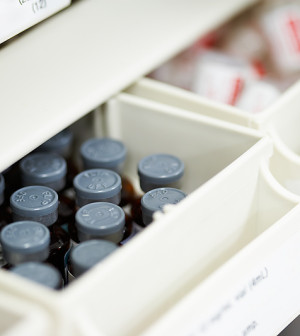- Understanding the Connection Between Anxiety and Depression
- How Daily Prunes Can Influence Cholesterol and Inflammation
- When to Take B12 for Better Absorption and Energy
- Epsom Salts: Health Benefits and Uses
- See What Saffron Can Do for Sleep and Heart Health
- 6 Common Mistakes to Avoid Before Your Physical
- Can Sweating Really Help You Beat a Cold?
- Strengthening Your Relationship: Practical Strategies
- Skip Storing This Everyday Product in the Fridge Door
- Green Tea + B3 Pairing May Boost Brain Health
Patients Can Self-Administer IV Antibiotics at Home: Study

Patients can be taught to safely self-administer long-term intravenous antibiotics at home, without the help of a health care worker, a new study suggests.
The finding could have a significant impact on uninsured patients who might otherwise spend weeks in a hospital receiving IV care, according to researchers at the University of Texas Southwestern Medical Center at Dallas.
“This really taps into human potential, giving a voice to the uninsured at the same time that it offers an opportunity for enormous cost savings to hospitals,” study first author Dr. Kavita Bhavan, assistant professor of internal medicine, said in a medical center news release.
Some infections require treatment with IV antibiotics for six weeks or more. Patients with insurance typically go home or to a nursing home and have their antibiotics administered by a home health care worker or nursing home worker.
But uninsured patients typically stay in a hospital for the entire time they need the antibiotics.
“Requiring these patients to be hospitalized for several weeks means loss of personal freedom for the patients and a delay in activities of daily living, such as returning to work and caring for children at home,” Bhavan said. “This practice also can lead to a tremendous cost for public hospitals, taking up beds that could go to patients who require more intensive care.”
The four-year study compared 944 uninsured patients who were taught to administer their own IV antibiotics and 224 patients who received antibiotics from a health care worker.
The patients who self-administered had a 47 percent lower rate of hospital readmission over 30 days. Death rates were similar in both groups.
The study was published online recently in the journal PLOS Medicine.
Study senior author Dr. Robert Haley, a professor of internal medicine, called the outcome a “win-win situation.”
“It’s an obvious win for the patients, who don’t have to sit in the hospital for six weeks and can go about their normal lives. It’s also a big win for the public hospitals. Having these patients take up beds has been costly for these hospitals, which are often full,” he said in the news release.
More information
The American Academy of Family Physicians has more about antibiotics.
Source: HealthDay
Copyright © 2026 HealthDay. All rights reserved.










